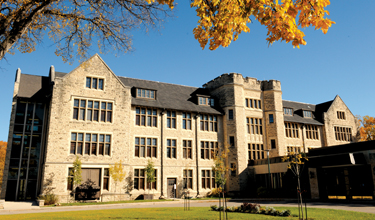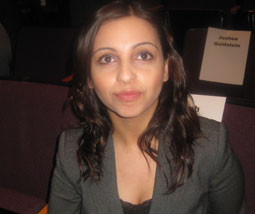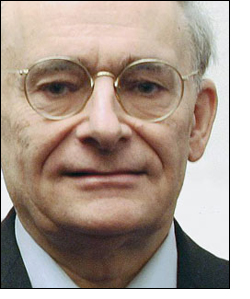Mahmoud Ahmadinejad
|
Seven Iranian Muslin clerics met at Canadian Mennonite University in Tuxedo in June, for three day of close-door discussions with seven Mennonite theologians from Canada and the United States, the Winnipeg Free Press reported. (Clik Here )
According to the Free Press report the Iranian scholars, consisting of Fanaei Eshkevari and six colleagues from the Imam Khomeini Education & Research Institute, insisted on closed meetings in order to prevent protests by pro-democracy Iranian Canadians against the Iranian regime.
A CMU professor told the Free Press that although these discussions were intended to be theological, not political, the Iranian scholars asked for closed meetings to prevent a repeat of protests by Iranian Canadians that shut down a public forum at a previous 2007 dialogue in Waterloo.
“It was they (the Iranians) who said we will not come if any of your events are for the public,” explained Gordon Zerbe of CMU.
Pro-democracy Iranian Canadians and human rights advocates have criticized the decision of the Canadian Mennonite University for acceding to this request by the Iranian scholars, arguing that the actions by the CMU strengthen the dictatorship of Iran, and undermine the need for regime change.
Sayeh Hassan, an Iranian Canadian lawyer, and human rights activist in Toronto told the Winnipeg Jewish Review that even if the discussions were “theological” in nature, (and not political) “these clerics certainly have a very pro-regime stand.” She pointed out, for example that in 2010 one of these clerics, Mohammad Fanaei Eshkevari in an interview with a Italian Magazine Vademecun stated “ Iran is the only democratic country in the middle east… Iran is the most popular state in the world… those who demonstrate against the government are a small minority. Western Medias do not show the reality.” (Read Here, emphasis added.)
After noting that the Iranian cleric insisted on a “behind closed doors” discussion to prevent demonstrations by “pro-democracy activists who support the overthrow of the Islamic Regime and creation of a secular and democratic government in Iran,” she criticized a Canadian University for agreeing to “such an un-democratic demand.”
As she said: “We live in Canada, not Iran, and while it is the norm in Iran to conduct many things including trials, torture, rape and executions behind closed doors, there is no reason for those anti-democratic practices to be carried into Canada by supporters or lobbyists of the Regime. I condemn any dialogue with supporters of the Islamic Regime who has for the past 32 years tortured, raped and executed hundreds of thousands of Iranians and who continue to do so. If this Canadian University was adamant on having these discussions they should at the very least have adhered to democratic Canadian values and made sure the discussions were open to public and transparent.”
A Google search done by the Winnipeg Jewish Review found that the institute from which these seven Muslim clerics come from is headed by Ayatollah Mohammad-Taqi Mesbah-Yazdi who is considered one of Iran’s most radical clerics and is the spiritual mentor of Iran’s President Ahmadinejad. In fact, Mesbah-Yazdi asked and received a budget for the establishment of the Imam Khomeini Education and Research Institute, which he currently heads. ( http://www.terrorism-info.org.il/malam_multimedia/English/eng_n/html/iran_e048.htm )
When asked for his reaction to this, David Matas, an international human rights lawyer, and Senior Honourary Counsel for B’nai Brith Canada, said “This sort of meeting is problematic because it can be used by the regime for propaganda purposes to give it legitimacy. Anything that helps keep the regime in power is, because of the very nature of the regime, something to be avoided.”
However, Rev. James Christie, Professor of Dialogue Theology and Director of the Ridd Institute for Religion & Global Policy at the University of Winnipeg, defended the actions of the Canadian Mennonite University. He wrote to the Winnipeg Jewish Review: “Given that the meetings are closed, I can hardly speculate on what or what might not be discussed. But talks between and among scholars, theologians and any other religious leaders hardly legitimate any given political regime. If there is no talk, there is no progress. I agree with the late Mr. Rabin: ‘You don’t make peace with your friends.’ To refuse to engage may satisfy a certain need to be or to be seen to be politically correct; little else.
“It is difficult to imagine Mennonites not addressing human rights concerns.
“As to outrageous statements by Iranian political leaders, I know that nothing I say influences Mr. Harper’s positions. How should I expect something other in a country with a regime such as Iran’s.?”
There is nothing in the WinnipegFree Press report which says specifically that the Mennonite scholars addressed human rights concerns.
Further, when asked by the Winnipeg Jewish Review to respond to Rev. Christie’s comments above, Matas replied: “In my view, the expression of human rights concerns, to be effective, should be public and persistent, at the highest level possible. The expression of human rights concerns behind closed doors dissipates the impact of those concerns.”
When asked whether he thought that the CMU ought to have met the Iranian clerics behind closed doors, former Liberal MP and human rights activist David Kilgour activist said, “Definitely not. I’m surprised the University would do so. They should know better the nature of the regime by now.”
Kilgour, who spoke at the recent Iran 180 Coalition in New York, told the Winnipeg Jewish Review that “We Americans/Canadians generally and the entire world have a responsibility to stand in robust solidarity with the struggle for dignity for all in Iran.”
The dialogue marked the fifth formal meeting between Shia Muslim scholars form Iran and Mennonite scholars, and the first time the dialogue took place in Winnipeg. These dialogues began after Iranian religious leaders wanted to learn more about the Mennonites who offered aid and relief supplies through the Mennonite Central Committee after the devastation of the 1990 earthquake in Iran.
Editor’s comment: The dialogue with the Iranian Muslim Clerics which took place in our city for the first time so happens to have occurred in the constituency which has the largest Jewish population in Manitoba and very near by, the Asper Jewish Community Campus. Next time the Mennonite scholars choose to invite pro-regime Iranian scholars we ought to suggest that both the Iranian and Mennonite scholars come join us for a screening of the movie “Iranian” about the dangers of a nuclear Iran. It is rather ironic that the screening of the film at an event sponsored by the B’nai Brith Prairie Region and Magen David Adom Canada, also took place at the beginning of June, right around the time when the clerics and Mennonite scholars were dialoguing down the road.
Readers may wish to remember that Robert J. Suderman, general secretary of Mennonite Church Canada, was among several Canadians who attended a dialogue with Iranian president Mahmoud Ahmadinejad in 2008 in New York. One of the sponsoring organizations was the Mennonite Central Committee. They discussed the role of religion in responding to global challenges and building peace and understanding between societies. (http://www.mcc.org/stories/news/religious-and-political-leaders-hold-peacemaking-dialogue )
Readers may also wish to note the recent reports that Iran was the mastermind behind the Syrian government’s backing of Palestinian refugees storming Israel’s borders on “Nakba Day” and has been backing Bashar Assad’s repressive actions to quell the ongoing protests in his country.They have aslo been delivering longer range weapons to Hezbollah in Lebanon and Hamas in Gaza, to be used, sooner or later, against Israel.












